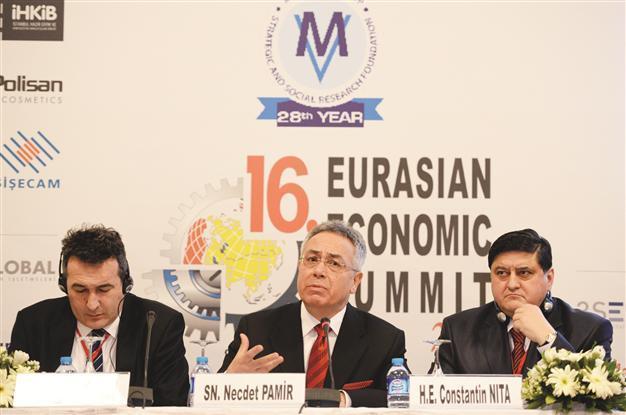Stability key factor for prosperity, energy representatives say
ISTANBUL - Hürriyet Daily News

Necdet Pamir (L), the energy committee chair of the summit delivers a speech during an elite enery session within the scope of the summit. DAILY NEWS photo, Emrah GÜLER
Stability, backed with strong finances and innovative technologies, is the key factor for a prosperous energy market, especially in the Caucasus and Caspian Sea region, leading energy figures said yesterday during the 16th Eurasian Economic Summit’s session on energy.
Stability will allow for an environment of secure trading and beneficial production for all, the session speakers, including Romanian Energy Minister Constantin Nita and Bosnia and Herzegovina Federal Energy, Mining and Industry Minister Erdal Thrulj, highlighted in separate speeches.
The Eurasian Economic Summit Energy Committee president, Necdet Pamir, said “points where countries fail to meet common ground for solutions” cause delays in projects, turning countries “from bridges to obstacles” in energy processes.
Former Italian Prime Minister Lamberto Dini also highlighted the importance of common solutions, defining the main obstacles as “political rather than economic.”
The world needs “collectively” to solve its issues for substantial development in the energy market and production, Dini added.
US success in shale gasNita said joint projects were important, adding that the summit may “contribute to a better understanding” as well as “formulating potential solutions.”
The United States’ success in the field with the discovery and use of shale gas shows the positive impact a secure environment for investment has when met with proper technological advancements, senior energy expert Edward Chow said during his speech at the session, citing regional disunity as one of the major problems in the Caspian Sea and Caucasus in the race for energy.
“Infrastructure that connects countries does not exist,” Chow said. “A fragmented system is in the region. Replacing the former Soviet Union with a geographical term does not do it.”
‘Timely investments’Timely and effective investment is crucial to having flourishing energy initiatives, Chow added.
Thrulj said the interest in the upcoming regions was eminent, but it had to be supported by “laws and legislation that provide security to investments.”
The need for cooperative environments and strategic partnerships that may harbor useful projects for the future of energy, which now is battling to find new sources to feed off, was also spoken about at the session.
‘Tsunami of energy’Natural gas, including shale gas, which is slowly being turned into profit by new technologies, may be able to alter the market’s focus grounds, creating “a tsunami” in new forms of energy, Dini said.
The decrease of Russian influence in the gas market combined with the upcoming new suppliers and buyers may also shift the balances, creating new forces in the field that may compete against the known figures, such as the Middle Eastern oil countries.
Global Resources Chairman Mehmet Öğütçü said the new buyers of energy, like China and India, which would soon become the new consumers of energy, would be welcomed in the market.
